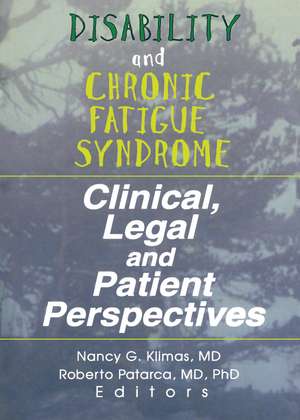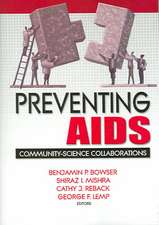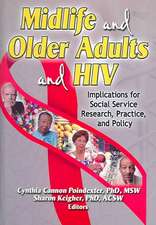Disability and Chronic Fatigue Syndrome: Clinical, Legal, and Patient Perspectives
Autor Nancy Klimas, Roberto Patarca-Monteroen Limba Engleză Paperback – 5 feb 1998
Essential for clinicians, lawyers, patients, and medical insurers, Disability and Chronic Fatigue Syndrome provides an outline of disability guidelines established by the Social Security Administration (SSA), the Veterans’Administration, and the American Medical Association, as well as federal guidelines. While gaining information on the different types of disability insurance available to chronic fatigue patients, such as the Long Term Disability (LTD) policy, you will also learn how standard procedures such as psychiatric evaluation, neuropsychological testing, and physical capacity measurement can both help and hinder the process of determining disability in a patient. In addition, Disability and Chronic Fatigue Syndrome provides insight into:
- the symptoms of chronic fatigue syndrome, such as inability to work and level of stamina, in accordance with medical and legal definitions
- disability guidelines set by the SSA
- how patients’varying symptoms and conflicting findings affect disability diagnosis in chronic fatigue syndrome patients by SSA standards
- plans by the Chronic Fatigue Immune Dysfunction Syndrome (CFIDS) Association of America to work with the SSA concerning strategies to dissolve barriers to Social Security Disability Income Benefits for patients and to advocate for up-to-date information on CFIDS in the SSA’s Listing of Impairments.
- tips on applying for SSA benefits
- claims that insurance companies have used misleading surveillance videos and fraud to discontinue disability benefits to patients in need of coverage
Since the Social Security Administration does not currently consider a CFIDS diagnosis enough to win a disability claim, Disability and Chronic Fatigue Syndrome also contains many recommendations for improving federal disability guidelines, such as using results from functional evaluations, neuropsychological testing, and exercise endurance testing as evidence of impairment. For less severe cases, this book provides you with suggestions for rehabilitation of CFS patients before disability claims are made, including patient training and education, dependency counseling, muscular conditioning, and occupational therapy. Whether you are a patient, clinician, lawyer, or medical insurer, Disability and Chronic Fatigue Syndrome will guide you through the complex issues surrounding disability and this intricate disease.
Preț: 131.04 lei
Preț vechi: 188.87 lei
-31% Nou
Puncte Express: 197
Preț estimativ în valută:
25.08€ • 26.27$ • 20.78£
25.08€ • 26.27$ • 20.78£
Carte tipărită la comandă
Livrare economică 08-22 aprilie
Preluare comenzi: 021 569.72.76
Specificații
ISBN-13: 9780789005014
ISBN-10: 0789005018
Pagini: 124
Dimensiuni: 156 x 216 x 9 mm
Greutate: 0.23 kg
Ediția:1
Editura: Taylor & Francis
Colecția Routledge
Locul publicării:Oxford, United Kingdom
ISBN-10: 0789005018
Pagini: 124
Dimensiuni: 156 x 216 x 9 mm
Greutate: 0.23 kg
Ediția:1
Editura: Taylor & Francis
Colecția Routledge
Locul publicării:Oxford, United Kingdom
Cuprins
ContentsIntroduction
- Editorials
- Chronic Fatigue Syndrome and Disability
- Disability Evaluation for Chronic Fatigue Syndrome
- Disability Evaluation
- Long-Term Disability for Chronic Fatigue Syndrome
- Neuropsychological Assessment of Chronic Fatigue Syndrome
- Impairment of Patients with Chronic Fatigue Syndrome
- The Legal Perspective
- Social Security Disability Program
- Disability Policy and CFIDS: A Washington Perspective
- A Primer for Chronic Fatigue Syndrome Claimants in Applying for Long-Term Disability Policy Benefits
- Perspectives on CFS and Impairment: Proposed Guidelines for Disability Determination
- The Patient’s Perspective
- Long-Term Disability: Long-Term Deception?
- Negotiating the Maze of Disability Insurance: One Patient’s Perspective
- Index
- Reference Notes Included
Notă biografică
Nancy G. Klimas, Roberto Patarca
Descriere
Disability and Chronic Fatigue Syndrome: Clinical, Legal, and Patient Perspectives explores methods to assess severity of illness and impairment in persons suffering with CFS. It shows that more work needs to be done to develop objective measures of impairment that accurately reflect the patient's degree of disability. Contributors explore possible answers to the questions: How can a clinician quantify the degree of impairment? How can the legal and judicial systems weigh the facts and the impact of this illness on each person with CFS? How does a patient persevere and get past the barriers, despite his/her illness?











